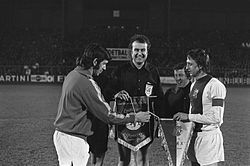 Greig in January 1969 | |||
| Personal information | |||
|---|---|---|---|
| Date of birth | 11 September 1942 | ||
| Place of birth | Edinburgh, Scotland | ||
| Position(s) | Defender | ||
| Youth career | |||
| United Crossroads | |||
| 1959–1959 | Whitburn | ||
| 1959–1961 [1] | Rangers | ||
| Senior career* | |||
| Years | Team | Apps | (Gls) |
| 1961–1978 | Rangers | 498 | (87) |
| International career | |||
| 1963–1976 [2] | Scottish League XI | 14 | (1) |
| 1963–1968 [3] | Scotland U23 | 3 | (0) |
| 1964 [4] | SFL trial v SFA | 1 | (0) |
| 1964–1975 | Scotland | 44 | (3) |
| Managerial career | |||
| 1978–1983 | Rangers | ||
| * Club domestic league appearances and goals | |||
John Greig CBE [5] (born 11 September 1942) is a Scottish former professional football player and manager who played as a defender. He spent his entire career with Rangers, as a player, manager and director. Greig was voted "The Greatest Ever Ranger" in 1999 by the club's supporters, [6] and has been elected to Rangers' Hall of Fame.


